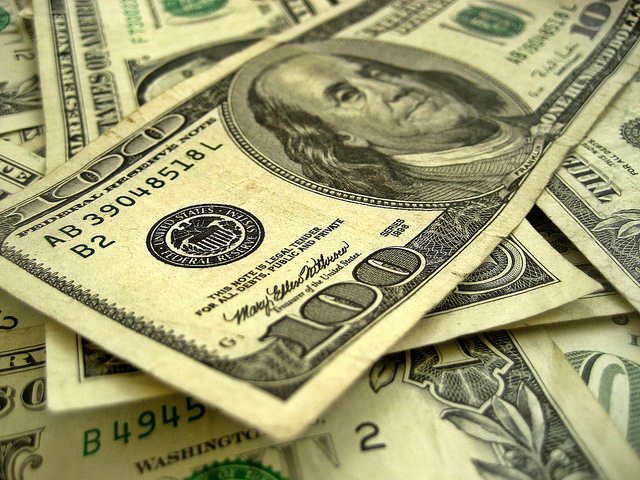Jag skrev häromdagen om hur jag kände mig rik på kärlek och tacksamhet. Jag kände mig verkligen stormrik och sa till maken att tänk om valuta ändå var kärlek och tacksamhet och det vi ger till andra människor i form av oss själva och inte en monetär pryl eller tanke. När det är så – då är jag otroligt rik.
Och känner samtidigt en oerhörd längtan dit, när det är så. Till den tidseran då vi inte längre tror på pengar. För det är ju bara hitta-på. Pengar är påhittat. Och så enkelt för alla vid makten att bibehålla detta som ett maktmedel. Detta är en av de få saker som vi i hela världen tror på och är överens om. Att pengar har ett värde. När jag skickar pengar via banken, telefonen och några siffror dyker upp hos dig. När jag använder en sedel eller ett mynt. Så tror vi alla på den påhittade historien att pengar har ett värde. Visste du att den första anledningen till att vi hittade på pengar var för att hålla reda på skulder. Skulder emellan oss. Även dessa är ju påhittade.
Här vill jag dela med mig av ett stycke ur boken Sapiens (ja, nu har jag läst ut den). Ur kapitlet “The Capitalist Creed” – och japp, det blir på engelska….
Economics is a notoriously complicated subject. To make things easier, let´s imagine a simple example.
Samuel Greedy, a shrewd financier, founds a bank in El Dorado, California.
A. A. Stone, an up-andcoming contractor in El Dorado, finishes his first big job, receiving a payment in cash to the tune of $1 million. He deposits this sum in Mr Greedy´s bank. The bank now has $1 million in capital.
In the meantime, Jane McDoughnut, an experienced but impecunious El Dorado chef, thinks she sees a business opportunity – there´s really no good bakery in her part of town. But she does´t have enough money of her own to buy a proper facility complete with industrial ovens, sinks, knives and pots. She goes to the bank, presents her business plan to Greedy, and persuades him that it´s worthwhile investment. He issues her a $1 million loan, by crediting her account with that sum.
McDoughnut now hires Stone, the contractor, to build and furnish her bakery. His price is $1, 000, 000.
When she pays him, with a cheque drawn from her account, Stone deposits it in his account in the Greedy bank.
So how much money does Stone have in his bank account? Right, $2 million.
How much money – cash – is actually located in the bank´s safe? Yes, $1 million.It doesn´t stop there. As contractors are wont to do, two months into the job Stone informs McDoughnut that, due to unforeseen problems and expenses, the bill for constructing the bakery will actually be $2 million. Mrs McDoughnut is not pleased, but she can hardly stop the job in the middle. So she pays another visit to the bank, convinces Mr Greedy to give her an additional loan, and he puts another $1 million in her bank account. She transfers the money to the contractor´s account.
How much money does Stone have in his account now? He´s got $3 million.
But how much money is actually sitting in the bank? Still just $1 million. In fact, the same million that´s been in the bank all along.Current US banking law permits the bank to repeat this exercise seven more times. The contractor would eventually have $10 million in his account, even though the bank still has but $1 million in its vaults.
Detta är ju galet – byggaren har 3 miljoner på sitt konto, banken har lånat ut 2 miljoner till bagaren och banken tror att den har 5 miljoner då….fast att det egentligen bara finns 1 miljon. Det är i dessa perspektiv som jag är för en medborgarlön. För vilka pengar är ändå på riktigt?
Och så ett litet stycke till från Sapiens:
If credit is such a wonderful thing, why did nobody think about it earlier (before the modern era) ? Of course they did. Credit arrangements of one kind or another have existed in all known human cultures, going back to ancient Sumer. The problem in previous eras was not that no one had an idea or knew how to use it. It was that people seldom wanted to extend to much credit because they didn´t trust that the future would be better than the present.
Nu i den “moderna eran” så tror vi så starkt på att framtiden blir bättre än idag, för så länge vi tror på det så upprätthåller vi även tron på tillväxt, att pengar finns, att vi ska klara oss, att vi har kontroll…..vi är total-lurade. Så känner jag idag. Lurad.
Visst är det 1 april. Men jag luras inte med dig. Men jag känner mig lurad.
Photocred to 401(K), Flickr.


0 Comments
Trackbacks/Pingbacks